Campbell Law in Cambridge
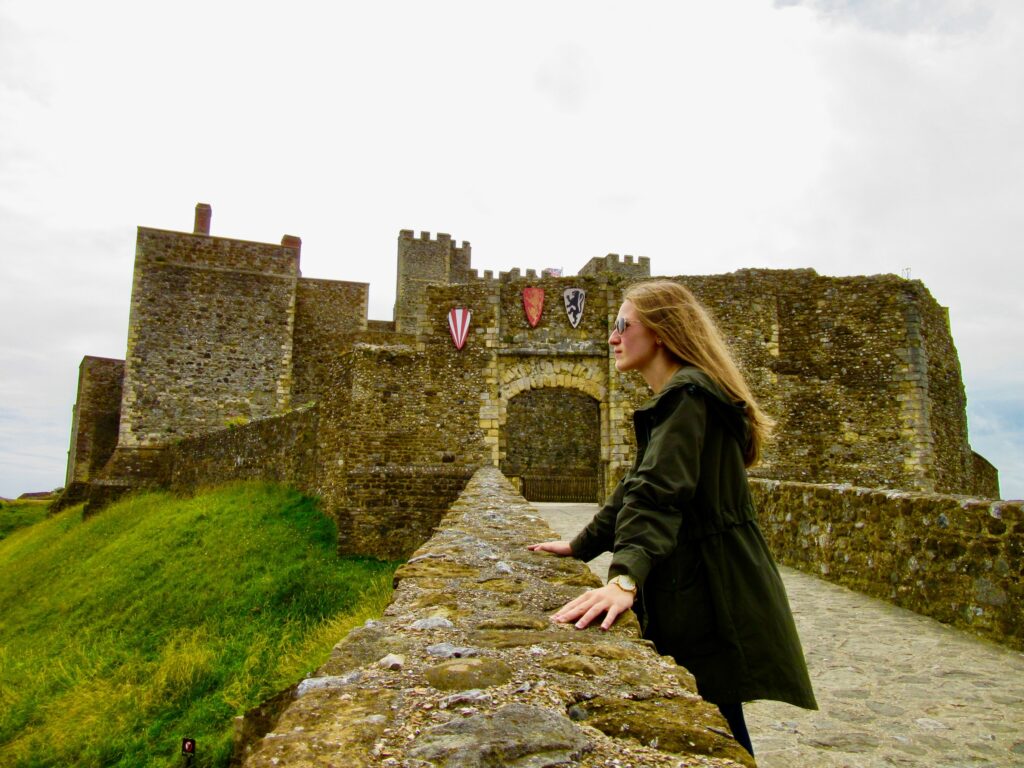
As soon as I said my goodbyes to my parents and friends at RDU airport, I found myself feeling a flurry of emotions ranging from complete excitement to nervous anticipation. This would be my first solo adventure abroad. Although I have only been in England for two weeks, so much has happened since I began my journey with the Cambridge Study Abroad program at Sidney Sussex College. Upon my arrival, Professor West from Cumberland Law, treated me to my first English afternoon tea. This was such a unique experience, as the English take their tea time very seriously. Professor West was also kind enough to give me a tour of the city. While exploring Cambridge, I found that it is very similar to any college town in the United States as it is filled with many food options, scholars, tourists, and various forms of entertainment. Although the city is very walkable, the best way to really see Cambridge is by punting the Cam along “the Backs.” Punting, similar to riding on an Italian Gondola, involves a boat tour of Cambridge. If you choose to have a guide do the punting for you, this proves to be a unique way to learn the many fun facts about the colleges. But, if you are brave, you can choose to punt on your own and get quite a workout.

Our first week of class involved a crash course on the English Legal System, taught by Professor Adrian Jenkala. Professor Jenkala served as a Barrister for 25 years. Essentially, a Barrister is our equivalent of a trial advocate. In addition to learning about the innerworkings of the English Legal System, we also took a class trip to London. On our trip we observed a trial in the Royal Courts. Interestingly enough, the Barristers still wear wigs and robes when arguing their case in court. This is an example of the many ways in which England preserves tradition in keeping certain “relics” of the past. It certainly makes for an interesting viewing of a court case, and creates a stark contrast to how we dress for court in the United States.
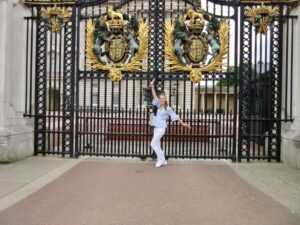

After watching a trial, we had the privilege of dining at the Middle Temple Inn. The Middle Temple is one of four inns potential Barristers are required to join before beginning their careers in the legal profession. Upon joining an inn, the potential Barristers must participate in various activities such as mock trial hypos to “gain their stripes.” While eating my meal, I was surprised and honored to discover that in 1602 Shakespeare’s “Twelfth Night” was first performed in the Middle Temple Hall. This was an exciting fact to learn, as it would be wholly relevant to our upcoming class on Shakespeare and Trial Advocacy.
Once everyone had finished their meals, we made one last stop at Parliament. Our visit to the House of Lords was very exciting, because they were expressing their concerns with a “no deal BREXIT.” The English Parliament operates differently than our Congress, as the members of Parliament are much more vocal during bill discussions and will even put forth a resounding “boo” to convey their distaste in parts of a bill. Seeing the Lords cheer and boo during the discussion made for an entertaining observation, and created a stark contrast to our electronically run voting system in our North Carolina State Legislature. Similar to all that is scholastic, our first week in Cambridge ended with a brief exam on what we had learned, as well as watching the U.S. Women’s team become world champions in the FIFA World Cup. As someone who played soccer for thirteen years of my life, it was fulfilling to watch soccer in a country that truly lives for the sport. Everyone would fill up the pubs for the games to cheer on their teams. The most fulfilling part of watching a soccer game in Europe was that regardless of if we were strangers, Americans would somehow find each other in the pub to cheer on the United States team to victory. This was very fulfilling to experience, because you realize that despite the polarization which exists in the States, we can still be unified on foreign soil.
To end my first week in England, I decided to take a spontaneous trip to London. My day trip transported me hundreds of years into the past, as I walked the cobblestone paths throughout the Tower of London. I never realized how massive the Tower was until I walked through it. There is so much to do and see, as this site is home to a long and bloody history. I found it useful to invest in the audio tour because I was able to walk about freely, take my time in doing so, while learning various facts about each part of the Tower. I found my favorite part of the site to be the section which housed the ravens. According to an old legend, the Tower and the crown will fall if the resident ravens ever leave the Tower. In accordance with this myth, the Tower keeps the required six ravens, plus one, to ensure this prophesy never comes to pass. Ravens are actually highly intelligent birds with the capacity to comprehend and even imitate human speech. I found it interesting to sit and watch the ravens communicating with each other on the grounds as tourists walked by, paying no mind to the birds. Of course, the Tower is better known for its long history of torture, as well as the fact it houses the Crown Jewels.
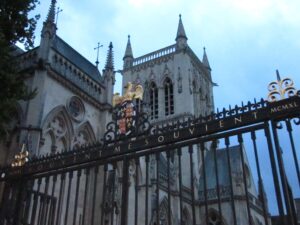
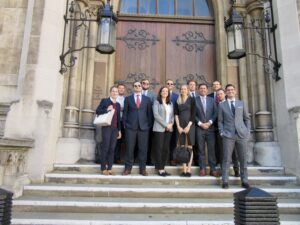
After spending several hours in the Tower, I caught the Tube to Baker Street. Any fan of the franchise I am about to describe should have perked at my mention of Baker Street. 221B Baker Street is the site of the flat belonging to the famous Detective Sherlock Holmes. Unfortunately, Holmes is a fictional character, but similar to the Harry Potter franchise, Holmes made a significant impact on English culture. Because of this impact, an exact replica of 221B Baker Street was erected so fans could walk through his humble abode. This was a really unique experience, and I highly recommend it for anyone who is a fan of Sherlock! To round out my day trip, I could not visit London without paying a visit to the famous Buckingham Palace. The palace itself is beautiful, and carefully contained within tall, blackened gates. I have to admit, as I waited to take a photo in front of the palace, I could not help but feel like the peasants before me who stood outside the gates to gaze upon the palace. In this sense, I suppose some things never change. Staring at the palace, I could not help but wonder what it would be like to actually see Queen Elizabeth II, since she has made such a huge impact on the modernization of the constitutional monarchy.
After my brief adventure in London, week two of classes began. Like many of my classmates, I chose to take the Law of the European Union and Shakespeare and Trial Advocacy. Although I have only been through one week in these classes, they both seem to be incredibly relevant to the legal profession as well as the modern age. Shakespeare and Trial Advocacy can easily be described as “Shakespeare Bootcamp,” because it reintroduces students to Shakespeare in a more relatable context. What makes this class more special is the fact that England is the birthplace of Shakespeare, and has become a major part of English culture. Not only did Shakespeare expertly craft his famous plays, but he also included law as an element in his storytelling. Until this class, I had no idea how much Shakespeare actually used law and trial advocacy as a central driving point to his story plots. So far, this class is proving useful in learning how to address jury members during a trial, as well as developing presentation skills for the court room. One perk to this class is we get to view film adaptations as well as live performances of the plays at the Cambridge Shakespeare festival before reading the plays. This is incredibly important to understanding Shakespeare, since his works were meant to be watched and not read. Watching the plays truly helps reduce the learning curve, allowing for better comprehension of his works and understanding of how it applies to the legal profession.
On the other hand, Law of the European Union is useful in that it better educates students on the issue of BREXIT. One thing I instantly discovered—actually on my first day in Cambridge while riding in a cab to Sidney Sussex—is I never left the political polarization in America. Although the United Kingdom is not faced with exactly the same issues as the United States, it is still facing a national split in terms of leaving the European Union in a little policy matter known as BREXIT. Taking this class, as it is taught by someone who has lived in England his entire life, has to be the best way to learn about BREXIT issues and has proven to be more helpful than reading up on the issue from news outlets such as BBC. Although there is still a great deal to learn about the complexities of the European Union, I believe my classmates and I are in good hands with the expertise of Professor Jenkala, paired with his own personal experience as a citizen of the United Kingdom.
One major highlight of last week came as a pleasant surprise. Rumors had been spreading around Cambridge that the city would be paying host to a prestigious guest. After lunch, on a warm, sunny Tuesday, Professor West, my classmates, and I hurried to Queen’s College in hopes of seeing Queen Elizabeth II herself. Queen Elizabeth II had come to Cambridge to view an exhibition celebrating a century of crop research, to dine at Queen’s College for lunch, and to pay a visit to the Royal Papworth Hospital. As she left Queen’s College in her car, we had the wonderful opportunity of laying eyes on the Queen as she journeyed to her next destination. Seeing the Queen was incredibly exciting as people were lining the streets to see Her Majesty, waving United Kingdom fans, and yelling with excitement. One thing I noticed while waiting to see Queen Elizabeth II was the Bobbies (police officers) were very friendly with the crowd. One particular moment actually involved a Bobbie removing his helmet and placing it on the head of a young child. Seeing moments like this really shows that community policing is at work all over the world.
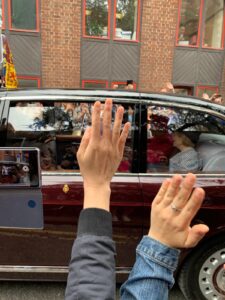
By the weeks end, I had read two Shakespeare plays focusing on case presentation to a jury and showing the burden of proof, and had learned about the basic parts of the European Union. With all this learning, it was time to take another trip to London. This past weekend I had the opportunity to explore the British Museum, walk the same grounds where all eight of the Harry Potter movies were filmed, as well as see some very famous paintings in the National Gallery. One thing that is incredible with the British Museum and the National Gallery, is these buildings are just as historical and artistic as the exhibits within their walls. Every part of these museums is something to appreciate. I found the Greek artifacts and the Rosetta Stone to be particularly interesting in the British Museum. Also, I was very excited to lay eyes on artistic works from Degas, Monet, and Van Gogh in the National Gallery. In addition to viewing these famous museums, I also decided to have tea at, the Pinterest famous, Peggy Porschen Cakes. This has to be the best cake I have ever tasted in my entire life. Sometimes, social media can bring about a wonderful experience!
To put it plainly, the best part of this past weekend was going to the Warner Brothers Harry Potter Studio Tour. I never realized how exciting visiting a movie studio could be. Having the chance to see all the props, costumes, and sets used in such a special franchise was an exciting experience. I even had the chance to learn more about film production and the daily lives of child actors in cinema. Ironically enough, part of my tour included a discussion on the laws concerning child actors and balancing their career with education. For any Harry Potter fan, I highly recommend this tour, you will even have a chance to have some delicious butterbeer midway through the studio! Although this is a lengthy blog post, this is truly representative of how much can be experienced in just two short weeks on this amazing trip.
